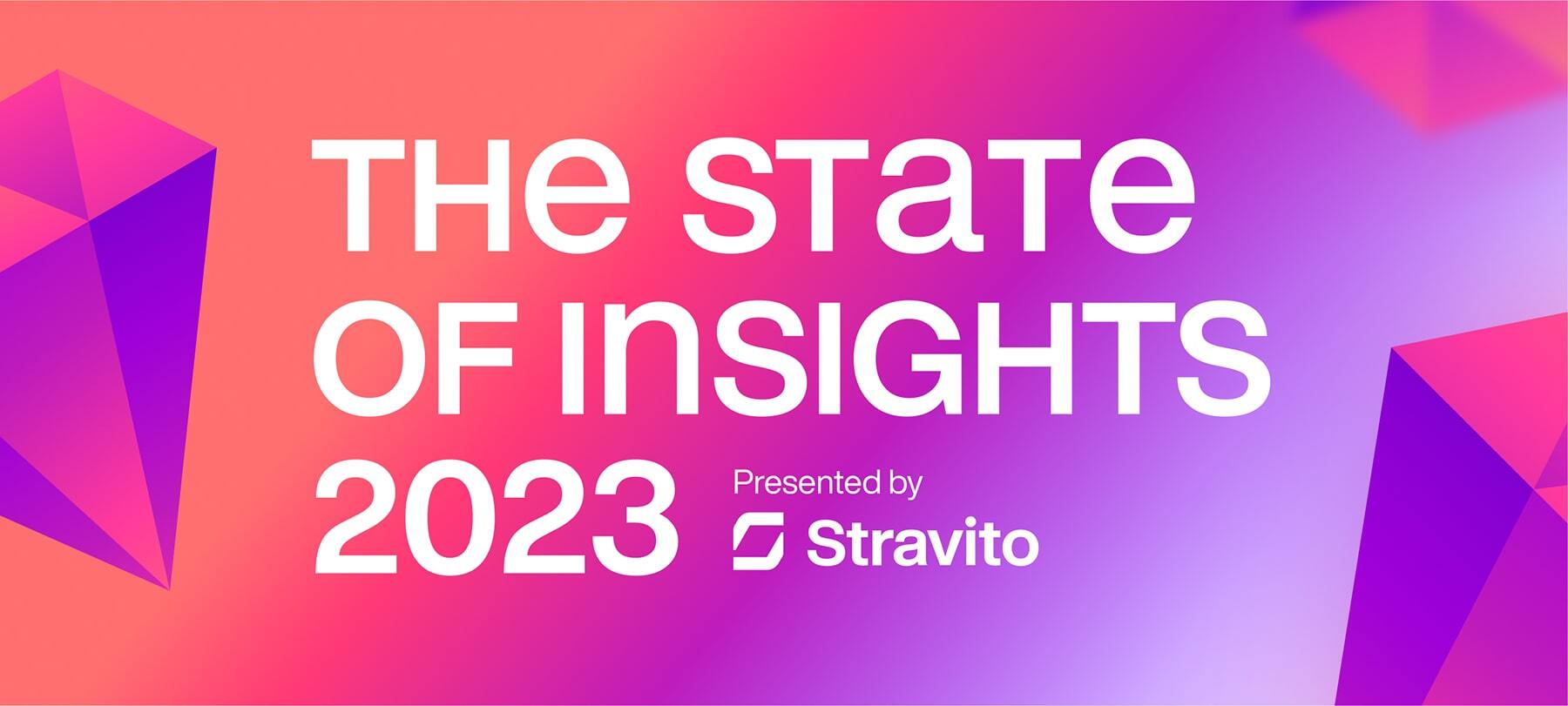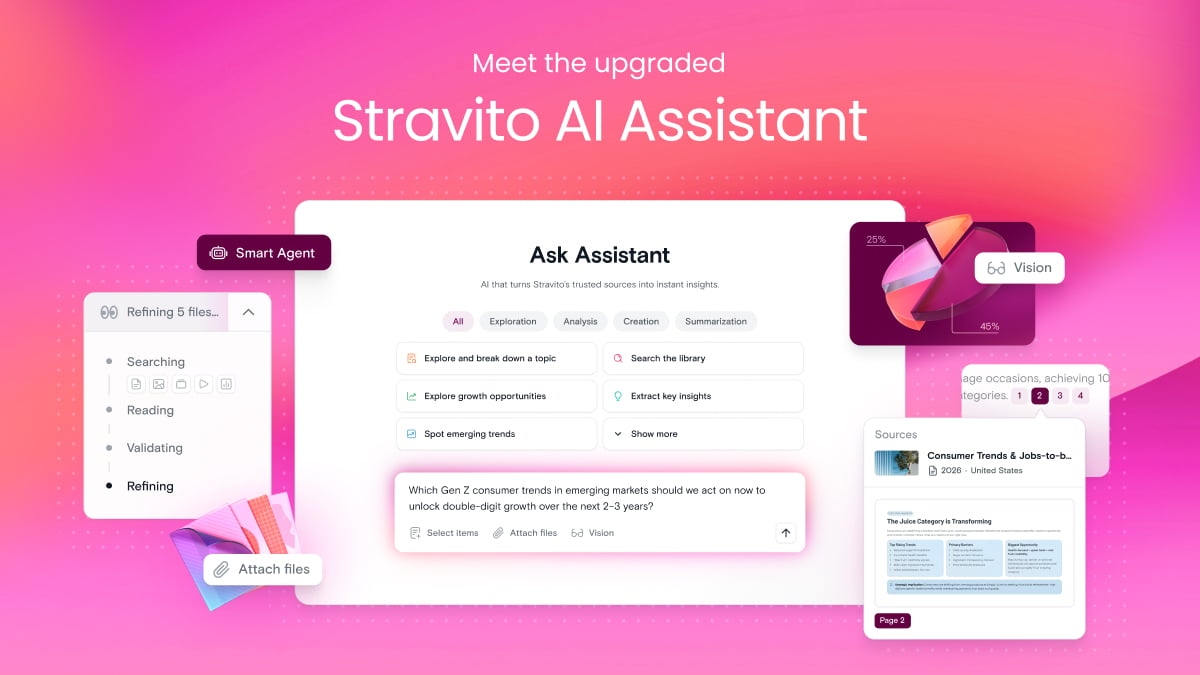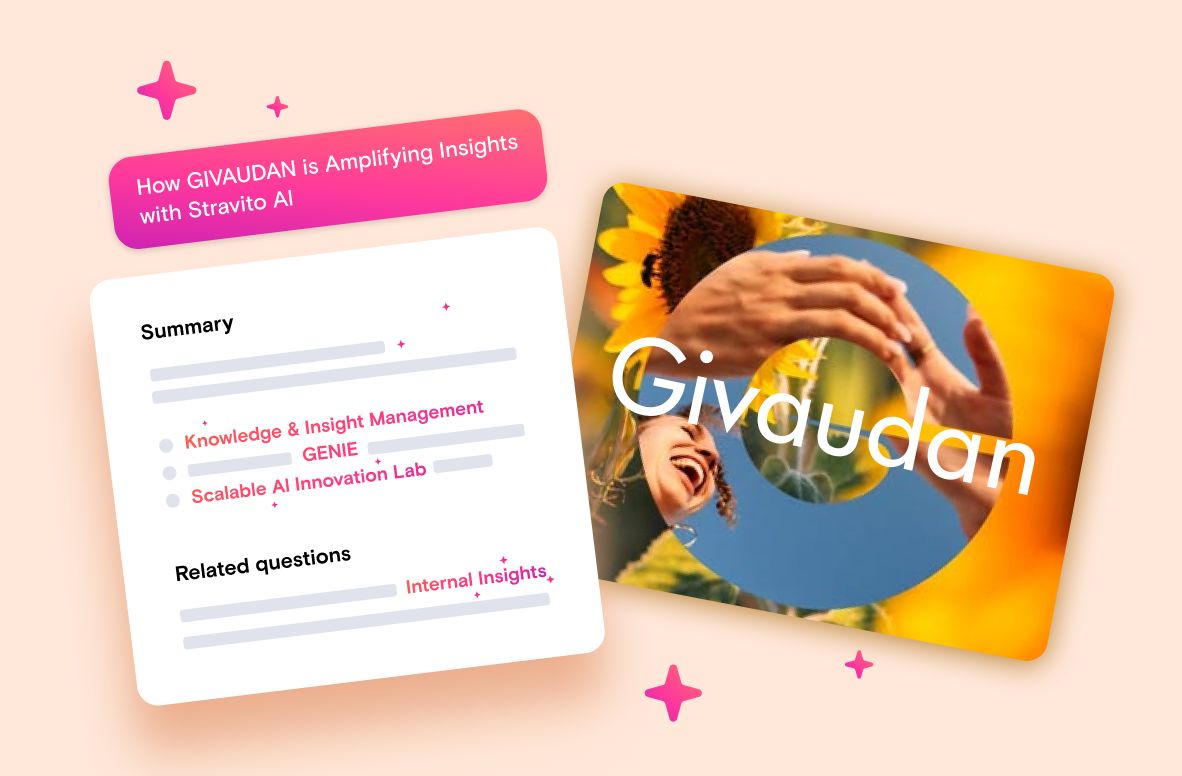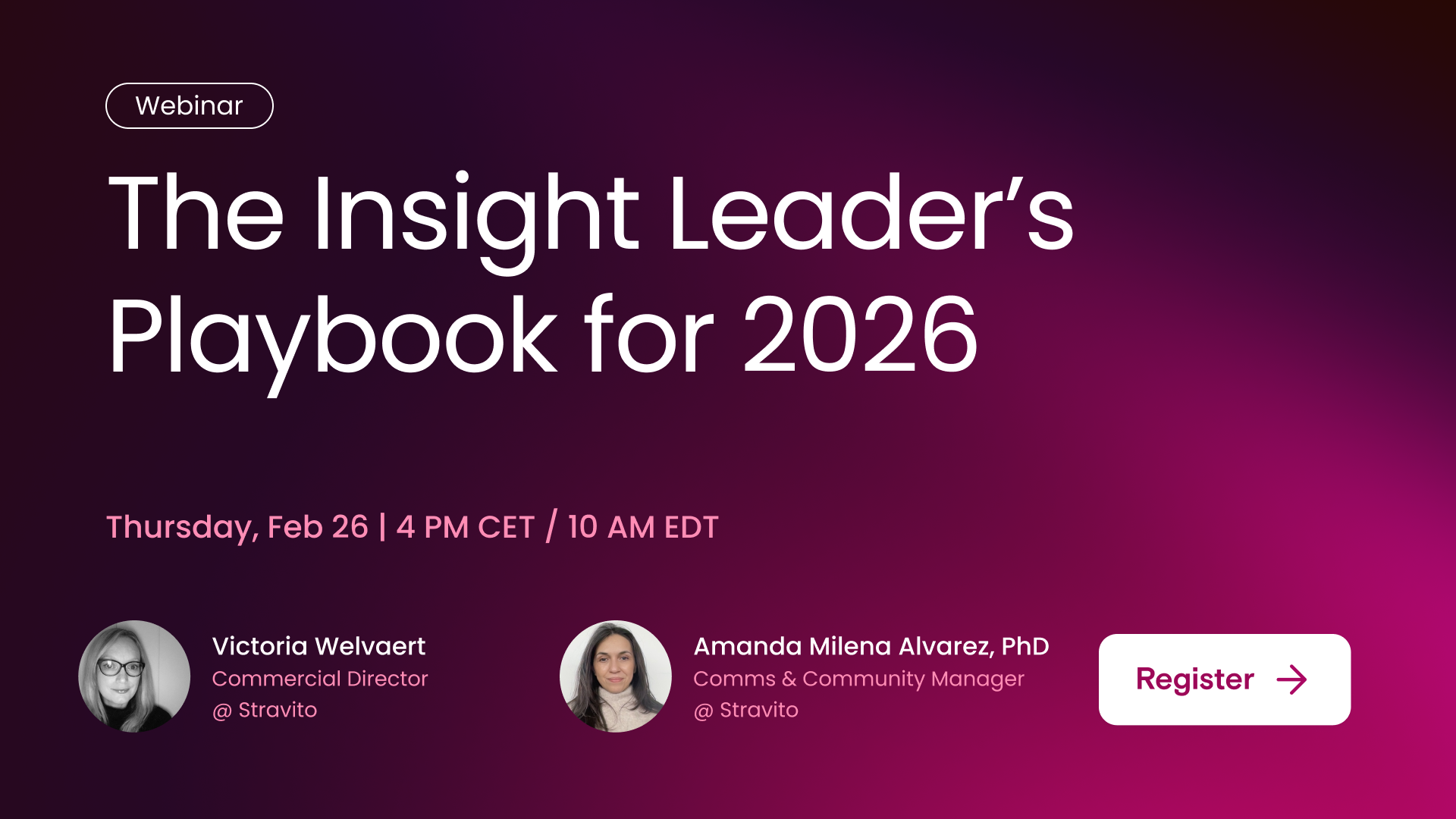In many ways, insights are like diamonds.
They come in a variety of different shapes and colors. They’re multifaceted, and depending on which angle you look at them from, you might see something different.
You have to dig and sift to get to them, but there’s absolutely no doubt that they’re valuable. The question is all about how to quantify and define their value. They mean different things to different people, but they are meaningful and in some instances priceless.
During the first season of the Consumer Insights Podcast, we’ve had the chance to hear from 17 leaders across the insights universe, from brand-side to agency-side, CX to strategy, qualitative methods to data science and beyond, sharing their views on their most valuable gems.
In this inaugural report, we’ve used those perspectives to create an overview of the philosophies, skills, tools, opportunities, and challenges that are on the minds of insights leaders today.
2. Why are insights important?
3: The DNA of a successful insights team
4. The insight leader’s toolkit
5. Opportunities to make business impact and challenge the status quo
7. What insights teams can do to thrive in 2023
1. What is an insight?
It’s a deceptively simple question: what is an insight?
While all of the insights leaders we spoke with had their own unique formulation, there were many areas of overlap across all of the leaders we spoke with on the show.
Broadly speaking, an insight was described as a combination of fact, human understanding, and intuition that can enable better decisions that impact the business.
Below, we’ll explore some of the specific nuances raised by the guests on this first season of the Consumer Insights Podcast.
Not a fact, not an observation, and definitely not data
One characteristic that was included in some way in all answers was that an insight is not the same as data, a fact, or an observation.
Though there was agreement that an insight needs to be grounded in data, a fact, or an observation, it was also made apparent that a true insight goes deeper than that.
The importance of tension
According to Edwin Taborda, Global Head of Insights at Electrolux, being grounded in data or facts was just one of 3 criteria that define an insight. The second was that it needed to hold a deeper motivation, some reason behind it. But the third, and perhaps most critical element was that there needed to be a tension within the insight.
Yogesh Chavda, Head of Market Insights at WSAudiology, also highlighted the importance of tension, describing it this way:
Getting people to understand, to go beyond just the facts and the observations to the tension points that are in the consumer's or the customer's mind is when you start to really understand what those areas are that you can influence through an insight.
The importance of intuition
Another nuance that appeared was the need for intuition. We live in an imperfect world, and therefore the data will rarely be perfect. That’s why it is essential for insights professionals to be able to rely on a strong, informed sense of intuition to fill in the blanks when needed.
For Rogier Verhulst, Head of Market Research at LinkedIn, intuition was key. He explained it this way:
When you don't have the data, there needs to be an element of intuition that you have to bring to the table. You have to use common sense or judgment to fill in some of these blanks and recognize that you can't always have perfect data of everything.
That's why I make distinction in data and insights, but it is really important because insights to me is something that's a little bit a mix or blend of what I'm observing, what the facts are, plus what my judgment or intuition is around those particular data points. That ultimately then gives you that deep understanding that you then need to make a decision.
No action, no insight
Another key theme that emerged was the importance of action, of “What’s next?”. Ashley Hopkins, former Head of Brand Strategy & Product Marketing at Wayfair and Head of Global Consumer Insights at ASICS, reflected on a motto from a previous manager:
If it’s not actionable, it’s not insightful.
Many of the leaders who joined the Consumer Insights Podcast this season shared that perspective – that an insight needs to lead to action or a decision, that ultimately creates business impact or unlocks growth. No action, no insight.
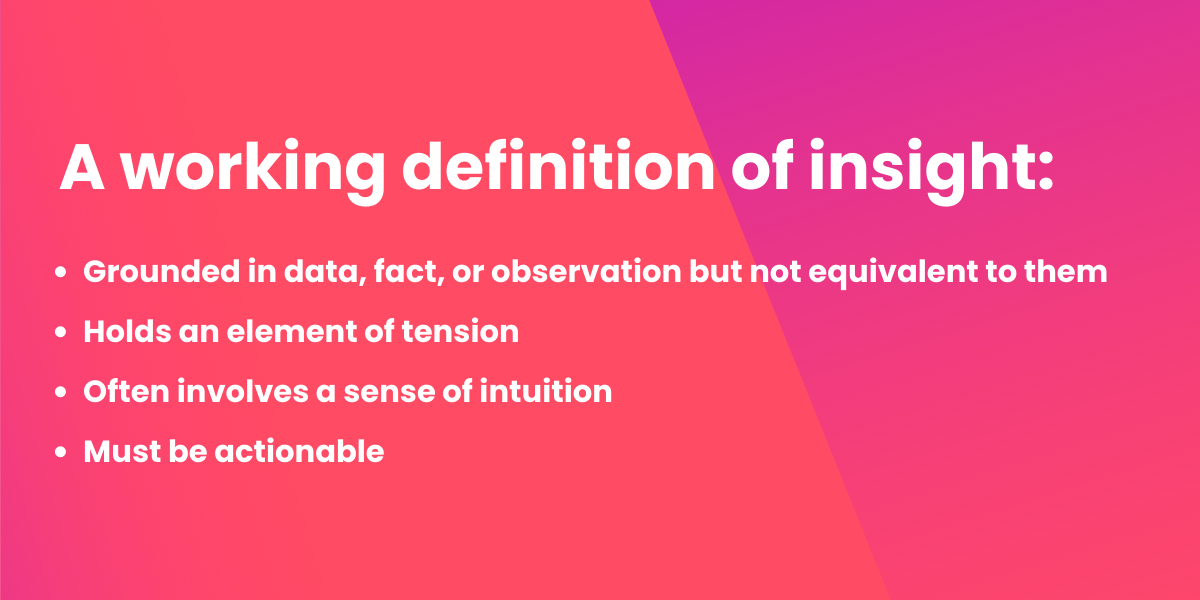
2. Why are insights important?
Another element we explored on the podcast was what makes research and insights so important for organizations.
It was clear that the benefits of insights are numerous. And many perspectives and examples illustrated the various crucial roles that insights play both inside and outside of the business.
Insights cultivate deeper human understanding
One reason that insights are important is that they have the power to help us to step out of ourselves and better understand others.
From this perspective, insights are also an important exercise in empathy, in cultivating an understanding of people other than ourselves, and using that understanding to make their lives better.
Rob Volpe, CEO of Ignite 360 and author of the book Tell Me More About That, explained the importance of insights in disarming our own biases:
If we don't have that input and that understanding of who the consumer is, we're going to default to thinking that it's ourselves or how we might want it. There's just so much bias. So often, we are not that consumer.
What are you going to end up doing? You're going to be throwing darts at a completely different dartboard than the dartboard you need to be targeting and addressing.
Dr. Emmanuel Probst, Global Lead for Brand Thought Leadership and Senior VP Brand Health Tracking at IPSOS, further built on the importance of this understanding by illustrating the role of insights in building transformative brands, a topic which he explores in his coming book Assemblage: The Art and Science of Brand Transformation.
Brands can no longer force us to buy plenty of products. To succeed, brands need to transform us and the world we live in.
Brands need to make a larger impact. So what's humbling… is to recognize that we marketers are certainly not controlling the narrative here. We must listen. We must understand what motivates people at a much deeper level, and from there build brands and products that contribute to people's fulfillment in life.
Insights are a source of competitive advantage
While empathy and human understanding have innate value, they also are a source of competitive advantage. There was broad alignment on insights as a source of competitive advantage.
Dr. Graham Kenny, Managing Director of Strategic Factors and strategy expert, explained:
Insight gives you competitive advantage. The very nature of an insight means that no one else has got it... if you've seen it from the customer's point of view, and everyone else is seeing it from the organization's point of view...then you've got a breakthrough.
If you've got a breakthrough, you've got an advantage. And it doesn't just apply to consumers or customers either. It can apply to employees, suppliers, any stakeholder group…
I think those firms which have gone ahead of the competition have been able to see something that no one else has seen.
Insights are a lighthouse when sailing stormy seas
Another key theme was the importance of insights in navigating rapid change or uncertainty, serving as a map for the business that shows a clear path forward.
Kyle Papanikolas, Global Insights Senior Director at McDonald’s, was one of several guests to share this perspective:
I think, especially right now, the reality is there's so much confusion out there...We’re still (fingers crossed) coming out of the pandemic, and the world has completely changed – but now you're piling inflation on top of that. People are like, "What the heck is going on right now?"
The other piece of it is there's so much data and information out there that it creates confusion. Honestly, people can cherry-pick whatever data points they want to support their story.
I think for me, one of the biggest things that the insights role plays right now is cutting through all of that clutter and providing clarity of “What is the truth and how do we actually use that to unlock growth?"
Insights mitigate risk and lead to better business decisions
As previously mentioned, insights need to be actionable. However, not all actions will be insightful.
Dr. Emmanuel Probst (IPSOS) demonstrated the value of market research and insights in mitigating risk when making business decisions:
To me, a very important second function of market research is to provide advertisers or brands with evidence to mitigate risk...
Where am I going to place my bets? I think that's the answer we are here to help solve. Where can I own the market? Where can I really compete versus what are the markets or what are the segments where I should stay away from or maybe pull the plug on?
Nikki Lavoie, EVP of Global Experience Strategy at Savanta and Vice President of ESOMAR, also offered valuable commentary on the role of insights in decision making, with the caveat that not all data leads to insights:
Getting to the point where you have insights, because not all data leads to insights–it really does take the human kneading of the data, as it were, to get to these nuggets of truth that allow you to make decisions...
Should we launch this product? Should we include these features? Should the price be X or Y?
You can make a decision, but if you are integrating data and consumer understanding, then you should be able to make better decisions. Your ROI, for anything that you are investing into, the product, brand, or service, should be multiplied, should be bigger and stronger.
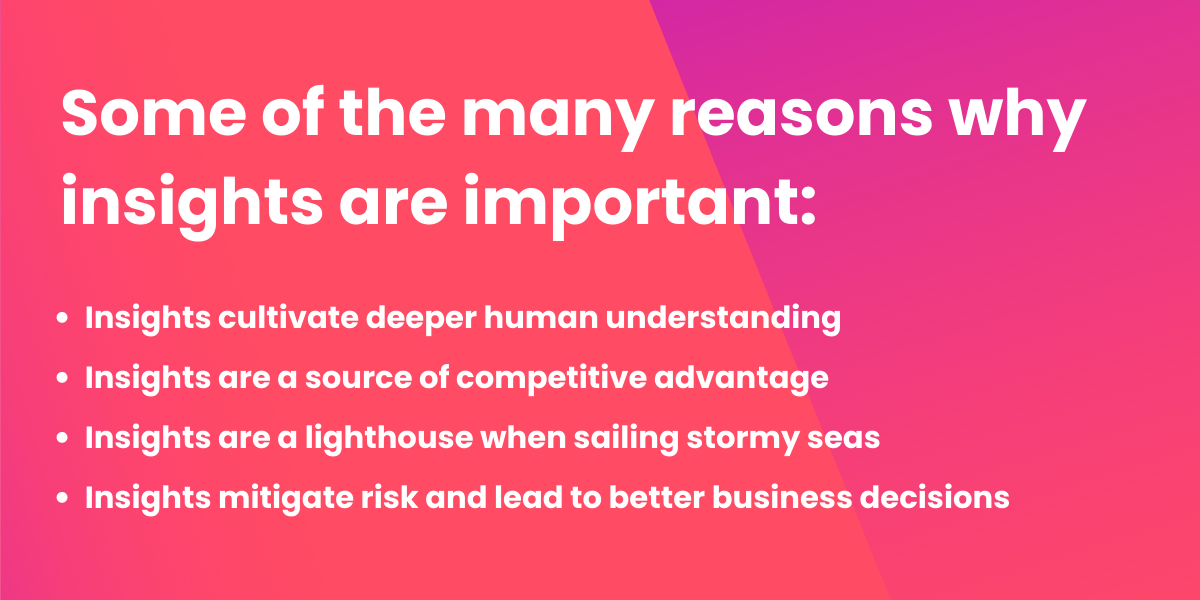
3. The DNA of a successful insights team
The insights leaders we spoke to on this season of the Consumer Insights podcast also shared their thoughts on the elements that create a successful insights team. Their answers explored the necessary skills and dynamics on the individual, team, and intra-organizational levels.
Diverse skill-sets make for powerful teams
On a team level, it was clear that when it comes to both hard skills and personality, diversity is essential; Not everyone needs to have every skill. By hiring both quant and qual backgrounds, introverts and extroverts, analytical minds and creative minds, you build a strong, well-rounded team.
Dan Kellett, Chief Data Officer at Capital One, offered his perspective:
Everybody has seen those pictures on LinkedIn of every skill that a data scientist needs. That's just not realistic.
What I think you need is those skills within the team…what that means is not only do you need to make sure that you're continuing to look at the overall makeup of your team in terms of technology skills, it also means people need to be able to work in a team.
This is not a game for individuals in my mind. I think it's something where you need to have a really strong ability to work with other people, strong communication skills, and really all focus on a single goal.
Certain skills transcend industry and experience level
However, there were also some skills that were seen as foundational, regardless of the specific industry or level of experience.
Yogesh Chavda (WSAudiology) described 4 skill sets that he looked for regardless of experience level:
Number 1 is leadership. Leadership is not just about being able to envision things, it's also about how you are implementing and executing, and rallying people around you to follow the vision that you're outlining...
Number 2 - thinking and problem-solving. Are you a problem solver or not? Can you think through a problem or not?
Number 3 - communication and collaboration. Are you able to influence people with what you know?
Number 4 - Are you agile? In other words, things ebb and flow, and things change sometimes on a dime, and you're going to have to work with it. Are you able to deliver what you need to deliver in a manner that gets in on time, so that people can make the right decision with the information that you're providing, or are you going to be coming six months later with the right answer, but the world has already moved on since then?
Those are the four primary skill sets, and I don't care which industry, what level of experience you've got. I think these are the four things that can help you, no matter what world environment we're in at the end of the day.
Hire for the skills that can’t be taught
Building on that, there was broad alignment around the idea that some skills just can’t be taught, like curiosity, empathy, humility, ambition, and open mindedness.
Nearly every single insights leader on the Consumer Insights Podcast named curiosity as a key skill to hire for.
Laura Eddy, VP of Research and Insights at Realtor.com, shared her thoughts on why curiosity was so important:
The key thing that I look for is really intellectual curiosity – looking for what is the right question to ask? Let's face it – most people come into, whether it's real estate, whether it's tech, things like that, maybe not knowing a lot about real estate, or they've not worked in tech before, or it's something where you have to learn the industry.
We can teach that stuff. What I can't teach is curiosity.
The necessary skills to elevate insights within an organization
Shifting the perspective slightly to the inter-team level, we also asked about what skills insights leaders saw as essential to help the entire organization share a common consumer-centric vision.
Confidence and conviction
Edwin Taborda (Electrolux) commented on the importance of self-perception for insights leaders and insights teams, explaining that in order to be seen as a strategic function (rather than a support or service function), they need to first see themselves that way.
When it comes to the DNA of the insights, organization, there is something that also relies within us, which is how we perceive ourselves. I have to acknowledge that up to some extent, many insights professionals still believe that insights is a service function, or is a support function.
In the DNA of a successful insights organization, it needs to evolve from that self-perception because it starts by ourselves. We need to really believe that we are a strategic function. We are a strategy organization. We drive paths, we can help the organizations to map where the north stars are going to be. We focus on our foresight perspective and try to imagine the future.
Another frequently cited dimension of confidence related to how insights are communicated to the broader organization. Rogier Verhulst (LinkedIn) underscored the importance of conviction when looking to elevate the role of insights in the organization and motivate the organization to act:
I believe in the three Cs which is creativity, curiosity, and conviction. I think that's really important. That last point is because on conviction, you need to be confident about what you're seeing in the data, and you need to be able then to get the organization to really act on it. That requires some conviction.
I see a lot of researchers holding back too much, or they're too conservative, or they undermine themselves by saying, "Well, I think it may mean this." Stand up and say, "No, it means this, we need to do these three things," I think shifts the bounds of how the organization should act on it and drive more urgency around it.
Relationship building
The ability to build and maintain meaningful relationships with stakeholders across the organization was also a commonly mentioned skill.
Having relationships with stakeholders that are built on a sense of mutual trust makes it easier to be confident and to positively challenge the organization when necessary.
But these relationships also help insights professionals to better understand the needs of each business area, which is essential for creating business impact.
Ashley Hopkins (formerly Wayfair) put it this way:
The more you can learn about how the business functions, the more successful you'll be. I think that there's so much of what we learn about human behavior that applies to parts of the business across organizations.
Building trust with these stakeholders, learning about their problems, and then doing somewhat like a PR push every time you find out these insights so that people know what's available to them and how to apply it is really important to being successful.
Kyle Papanikolas (McDonald's) also shared why he thought relationship building, along with other soft skills are essential for insights professionals today:
To me, especially right now, the biggest power is more in the soft skills of relationship-building, storytelling, working together with other people in collaboration. Also to be quite honest...insights people tend to be more introverted. They don't like to speak out and share information. All this great data and information and knowledge just sits inside them.A big part of it is how you can go out and proactively share what you're learning and understanding and drive more influence that way. Not just keep it locked within the department to where it doesn't drive any business impact or people don't know about it.
Taking calculated risks
Anup Pradhan, VP/Head of User Research, Insights, and Behavior Science at Swiggy, offered a perfect example of where skillsets like confidence and relationship building intersect – when balancing risk taking, agility, and precision. He explained it this way:
The second facet to risk taking is taking a stand - and I see this to be an area that the insights community can improve as a whole.
We are very sure about our data, we want to say the right thing, but it's absolutely okay to be human about it and just kind of take that risk and take your stakeholder along with you saying, “Knowing what we are, this is the best that we can do potentially about this.”
And I think that is a sense of partnership as well. So I think risk taking is important and precision has been like the guarded one that we've been holding since the longest time. If you think about researchers, you think about precision. But I don't think we live in that world anymore. I think we live in the world of probabilities.
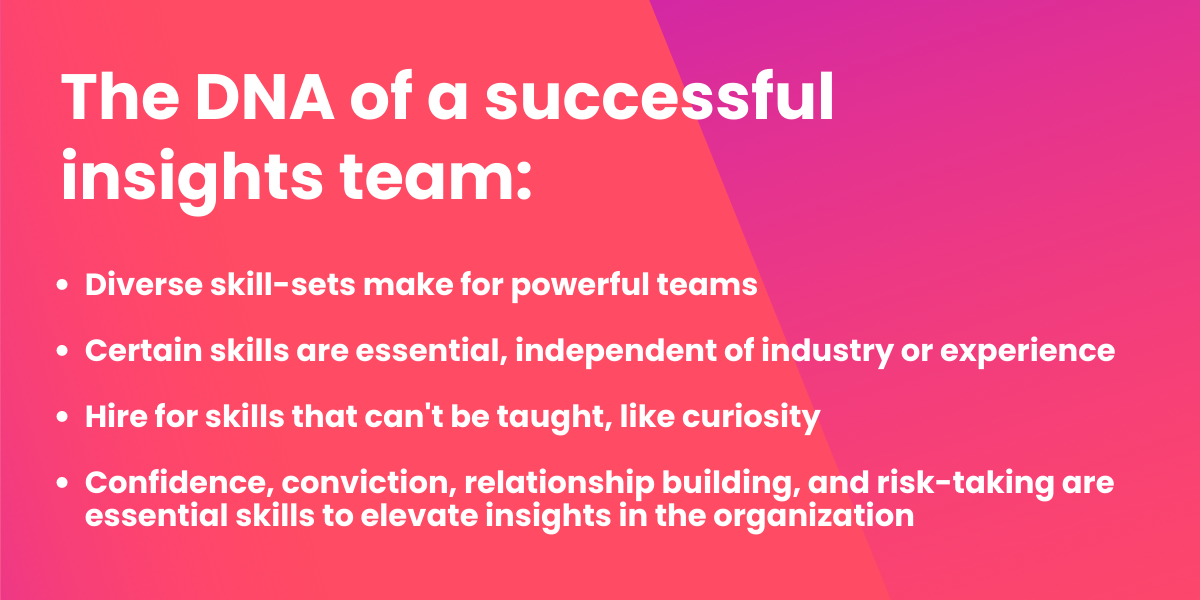
4. The insight leader’s toolkit
When asked about the tools necessary for the modern insights team, many of the insights leaders on this season of the Consumer Insights Podcast started by first discussing the necessary capabilities.
Capabilities > Tools
At the end of the day, the most powerful technology in the world will be useless if no one wants to use it. That’s why building an insights tech stack based on the capabilities an insights team wants to prioritize is essential.
The exact needs of every organization will always differ, but there were core capabilities like data collection and analysis that were referred to by several of the insights leaders. Getting quality data was naturally a highly important capability, as was the ability to conduct agile research. Self-service access was also frequently mentioned.
There was also a strong emphasis on tools that support capabilities like storytelling and insights communication, which help to elevate the role of insights in the organization, build stakeholder buy-in, and create business impact.
While several of the guests did not mention specific tools, a few guests did choose to highlight specific ones. Some of the tools that were mentioned include:
| Analysis tools | survey tools | qual tools | ad testing | visualization | repositories |
| SPSS | Qualtrics | Voxpopme | Zappi | PowerBI | Stravito |
| R | SurveyMonkey | UserTesting | IPSOS | Tableau | Google Drive |
| Swayable |
The role of agency partners
When asked about the essential tools to support insights professionals, Anup Pradhan (Swiggy) had a slightly different take and zeroed in on the importance of agency partners in enhancing internal capabilities.
One of the toolkits in the end user researcher arsenal is your agency partners. However awesome teams that we are, we need great research agency partners to partner with us. It's impossible for us to achieve the scale or actually kind of make a strong impact without strong agency partners...
Find your agency partners that you can trust and you can work with. That will help you conquer much much more internally and have a larger canvas to play with as well.
While research agencies continue to play a key role in the work of brand-side insights teams, there is also a clear need for agencies that can bring technical expertise, from realms like eye tracking and advertising tech.
For example, in our conversation with Mike Bartels, former Senior Director Enterprise Research at Tobii, he illustrated how eye tracking technology can bolster an insights tech stack:
We tend to think of eye tracking as a complementary methodology for whatever else you might be doing. We always recommend that it's used alongside qualitative methods, other types of biofeedback methods, and other types of big data. Whatever you're already using, eye tracking can be an enhancement to that or give you another data stream that's giving you a different look at consumer behavior than anything else.
In terms of how it compares, some of the advantages are objectivity. This is the number one advantage. You're recording exactly where someone's eyes are pointed in real time and seeing that data unfiltered.
There's really no way for a consumer to mislead you with where their eyes are looking. You're seeing their natural experience and able to draw insights from it.
Technical expertise can also be a major asset to insights teams in helping their organizations to solve pressing challenges like the cookie-less future, as Gilad Barash, VP of Analytics at Dstillery, explained on his episode:
At Dstillery, we've been working on technology that allows us to do all of that without those third-party cookies as far as modeling/creating audiences, and as well as deriving insights because what we discovered is that ID-free does not mean insights-free. We are still able to (and this is something that companies are working on today) find new methodologies to derive insights about the consumers, even without the third party cookie in order to continue to enable meaningful engagement.
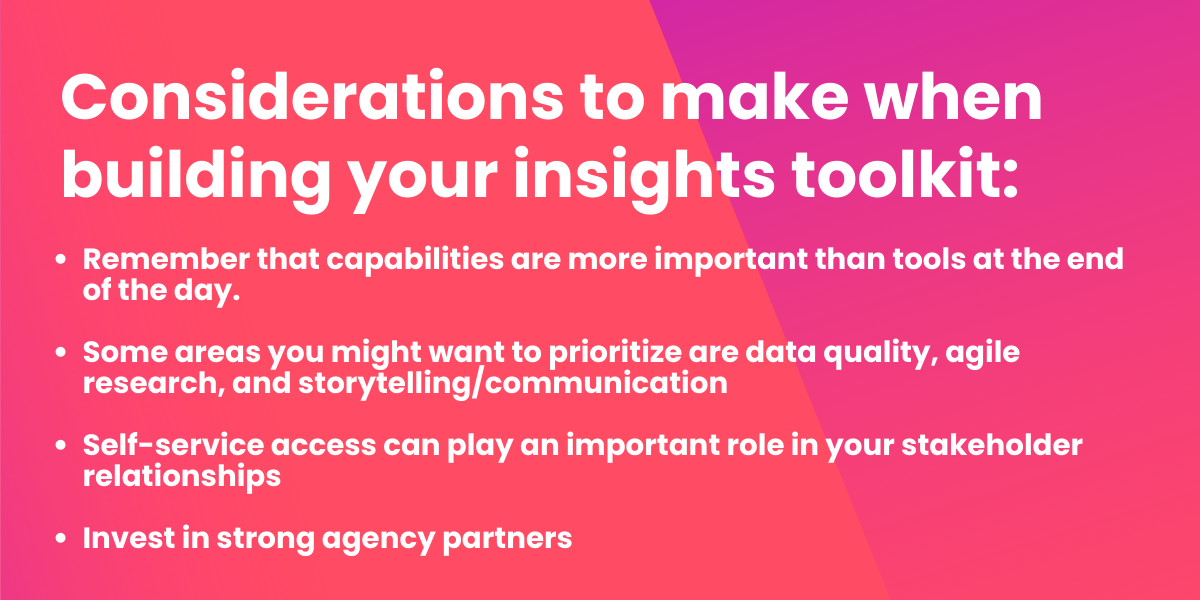
5. Opportunities to make business impact and challenge the status quo
Another area we discussed with insights leaders were the opportunities available to insights professionals to make true business impact and challenge the status quo.
Many described these opportunities as an extension of their ambition to elevate the role of insights, and their responses were ultimately grounded in the importance of insights.
Insights teams have the opportunity to make a business impact, but also to drive positive change, beyond the top or bottom lines.
Fighting for a seat the table
As previously discussed, insights professionals are needed now more than ever to help guide their organizations through times of rapid change and widespread uncertainty. But this requires insights leaders to fight for a seat at the table, which is often a task in and of itself.
Laura Eddy (Realtor.com) explained why she encourages her team to get a seat at the table:
So one of the big things that I really challenge my teams with is having that seat at the table when decisions are being made, business questions are being asked early in the process. Sometimes it is easy to fall into a habit of organizations, especially, you know, organizations that are moving very quickly to say:
“I need a study run on ,” or a product manager to say, “I need you to run a survey with these questions.”
Research should be involved much, much earlier, and I think one of the ways that unifying function happens is to make sure and really advocate for that voice of the consumer, customer, user literally being like almost sitting on the shoulder of every stakeholder, whatever their function is, and having that voice in their head as they are considering whatever decision they’re products, message, etc.
Asking the hard questions
In order to challenge the status quo, insights professionals need to be prepared to ask the hard questions – both with the organization and with themselves.
For Priscilla McKinney, CEO of Little Bird Marketing, those conversations have to start with challenging your own mindset. She explained:
Challenging the status quo, I've gotta say, starts at home. So if you're not challenging your own mindset, then I don't think that you can come to the table and ask someone else to really question their own. I think it's a way of engaging with the world, and I would say as a cultural anthropologist, it's also understanding that there's an emic view, and there's an etic view.
And it doesn't matter what you do, or as far away as you get from our own strategies or goals, there's always another way to look at things, right?
Within the organization, this can look like being bold enough to ask the questions that you think should be asked, rather than what you are being asked to ask, as Rogier Verhulst (LinkedIn) mentioned in his episode.
But within the insights team, it also requires you to ask the hard questions of yourself and your team.
Nikki Lavoie (Savanta/ESOMAR) highlighted the need for more multifaceted research but also the need to understand the barriers blocking change, explaining it this way:
We have to be prepared to have tough conversations. I think that the research that is being done, that will challenge this status quo, probably needs to be a little bit more multifaceted than what, at least I, have been seeing for the last few years…
Why are you holding so fast to the status quo? Is it because of your own job? Is it because of the objectives that you have been given from your higher up, or from the shareholders who are running the company? You really need to come at this from a 360-approach and figure out what are all the barriers to blocking change, and address every single one of them.
Annie Petit, Chief Research Officer (North America) at E2E Research Services also offered relevant commentary on this topic, highlighting how doing things a certain way just because that’s the way they’ve always been done can lead to pervasive issues in research, like the repeated under-representation of marginalized groups:
Look at the research you're doing right now. What's the design you're doing right now and truly ask yourself why am I doing it like this?...
If you instantly have an answer for here's how I do it, question yourself, why? Why can't I do it differently? How can I do it differently? What am I missing by just doing it the same way every time? It's difficult, it makes your research take longer, but truly it is better in the long run.
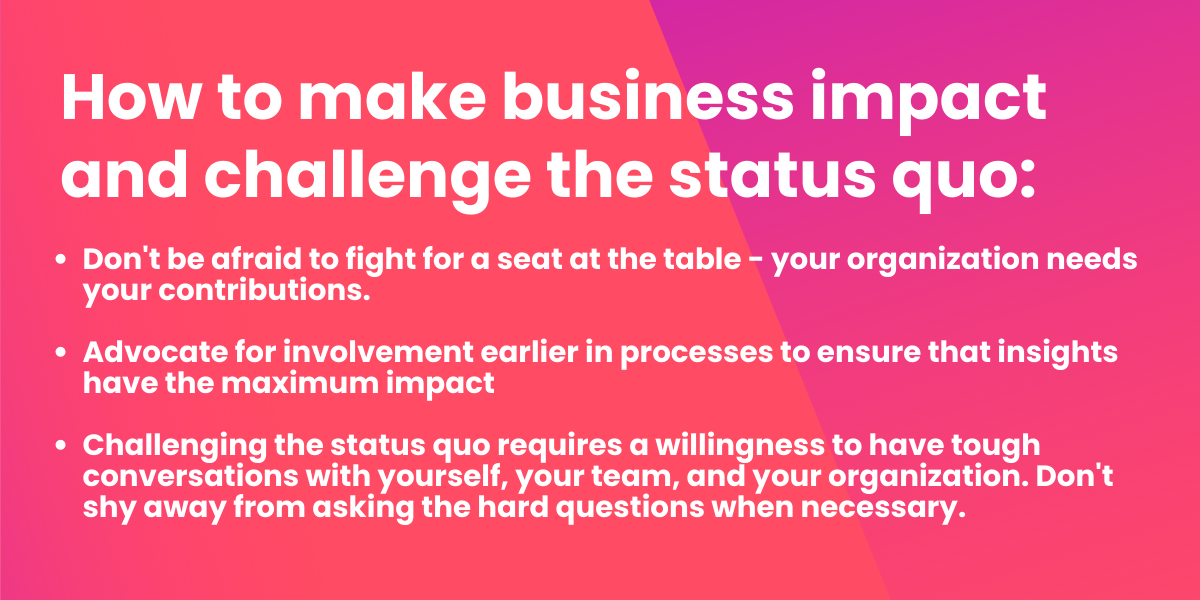
6. Challenges on the horizon
Of course, challenging the status quo is never easy. Many of the opportunities discussed also held an element of challenge to them.
Today’s insights professionals face both challenges that come from within their organizations and external factors that put pressure on their work from the outside.
Increasing data, increasing need, decreasing resources
Several insights leaders highlighted the internal challenges. On a foundational level, there is an increasing amount of data and an increasing need for the expertise that insights professionals can provide.
However, this creates a situation where insights professionals have less time to help the organization make sense of this data. At the same time, the resources available to insights teams are not increasing at a pace to match, and in today’s economy, often being reduced.
Anup Pradhan (Swiggy) raised it this way:
One is that we have to learn to do more with less. It's one of the values that Swiggy has, which is “Do more with less.“ And I truly believe that it's applicable on the insights professionals.
We have smaller teams. We will have budget cuts, and I think how you can get maximum juice and impact is the way you should plan for your teams and you should plan for the work to come. It's a reality that's likely to be here and I think one should embrace it and find ways in which you could actually do better.
Curating the narrative without alienating stakeholders
Another challenge is to maintain a strong position in the organization and guide decisions, without disempowering stakeholders or damaging your relationship with them. Kyle Papanikolas (McDonald's) described this delicate balancing act:
You have to be very, very careful about how you control the narrative within your company. A big part of what we're doing and you have to be very careful of how you actually go about doing it, cause you don't want to go out and be “judge and jury” on everything because that helps break relationships.
I think it's really important going back to what we were talking about: soft skills, building relationships with others, collaborating with them. Then they want to work together with you and not to go off and do the wrong thing or cherry-pick the wrong story. A big part of overcoming that honestly is just building relationships with other people within your company.
Low levels of empathy
There are also broader societal trends that are making insights work more challenging today, like polarization and disconnection from others. Ashley Hopkins (formerly Wayfair) and Rob Volpe (Ignite360) both noted a lack of empathy in today’s society, which can make it even harder for us to see perspectives outside our own.
Rob Volpe pointed to some of the work that his agency has done:
In some work that Ignite 360 has done, we asked that same question to American adults: “How easily can you agree with this statement, ‘I can easily see the point of view of other people?’” Nearly one-third of people were unable to even agree with that question…
One-third of the adults that you're going to run into today are unable to easily see your point of view, which means if you have a problem, issue, challenge, and you need help, they may not see where you're coming from. That's really concerning to me.
The rise of remote work
The tendency towards remote or hybrid work was also raised as a potential obstacle to connecting with organizational stakeholders. Ashley Hopkins explained:
Remote work can be really great, but I think it also has challenges for folks like insights professionals who need to hear what's going on inside other teams...
I used to joke that my team was a lot of pollinators that would just take information from one team and bring it to another team and help figure out how to make sense of the whole thing.
I think working from home presents a unique challenge for insights professionals just because that's somewhat taken away.
Increasing competition for consumers’ attention
Another challenge that was raised was the increasing competition for consumers’ attention. In a world of constant content creation, brands will need to think outside of the box to compete. Dennis Wakabayashi, Chief Collaboration Officer at Team Wakabayashi, offered particular insight on this topic:
There are CX contributors all over the industry, whether they're content creators, graphic designers, video producers, influencers, mommy bloggers, all of these other people in the ecosystem who are rapid-fire, those are the people that will start to replace the customer experiences at scale, if brands don't learn to adapt to multiple channels and a high speed of content.
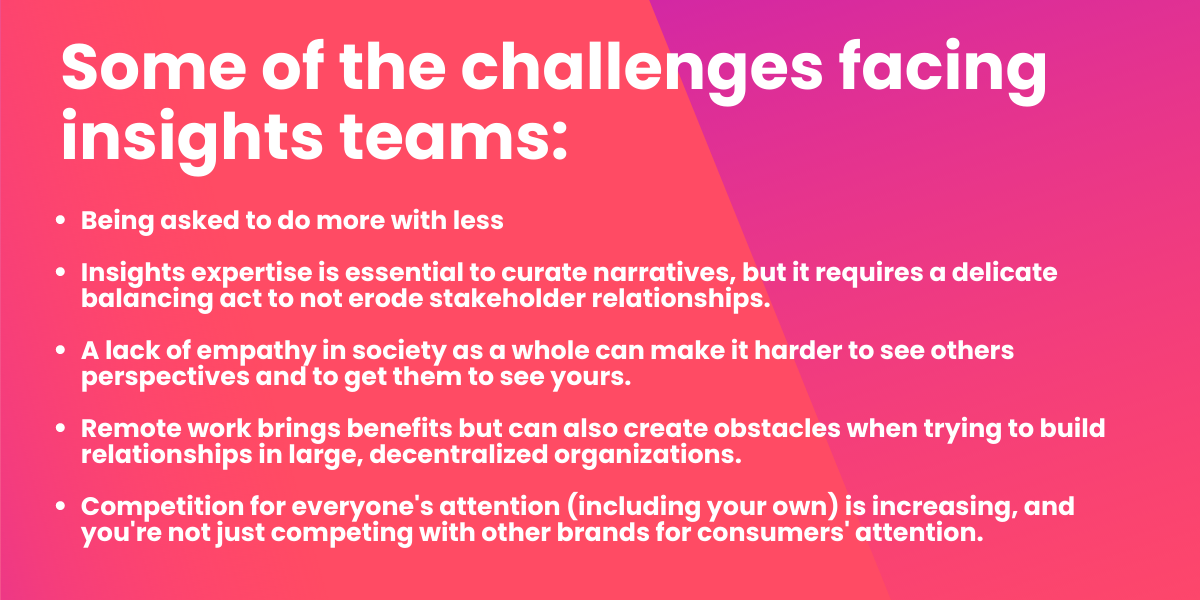
7. What insights teams can do to thrive in 2023
Invest more time in stakeholder relationships
Stakeholder relationships are key to increasing your influence and business impact. Building meaningful relationships with stakeholders across the organization will help you to better understand their business problems and cultivate the trust needed to have difficult conversations.
Advocate for the importance of insights
Insights and insights teams are more important than ever to help businesses navigate uncertainty and make informed decisions. Embrace the contributions that you and your team make to the business, like nurturing competitive advantage, guiding business decisions, and modeling the importance of empathy.
Don’t be afraid to challenge the status quo
Whether it's the organization, your team, or yourself, don't be afraid to challenge the ways that things have been done. If you're organization doesn't already see you as a strategic function, start by reflecting on your self-perception. Ask stakeholders to involve you earlier in processes, and have conviction when sharing your professional opinion.
Build diverse, curious teams
A well-rounded team will help your organization be prepared for whatever comes your way. Build a team with a diverse variety of skillsets, blending hard and soft skills, introversion and extroversion, quant and qual expertise, analytical and creative minds. Not everyone needs to have every skill, but they do need to have a strong sense of curiosity and willingness to learn.
Identify capabilities first, then tools
Before investing in tools, identify the capabilities your team or org needs to solve for. Don't underestimate the importance of self-service, as well as the ability to easily share insights to the right people at the right time. Remember that agency partners are also a key part of your toolbox, whether that's a traditional research agency or one that has unique technical expertise.
Make time for reflection and introspection
Slow down regularly to make more space for those "Aha" moments. Spend more time on hobbies that give your brain time to process, and encourage your team to do the same. Look to other industries for inspiration, and connect with other insights professionals to learn from each other's experiences.
Explore all episodes of the Consumer Insights Podcast
Of course, we couldn't cover all of the wisdom shared in the 510+ minutes of conversation from this season of the Consumer Insights Podcast.
If you want to explore all of our episodes, you can find them on Apple Podcasts, Spotify, and Google Podcasts. Or head straight to a particular episode below:
- How to Conduct Meaningful Market Research with Annie Pettit, Chief Research Officer, North America, at E2E Research Services
- The Role of Insights in Delivering Sustainable Business Growth with Edwin Taborda, Global Head of Insights at Electrolux
- Leveraging insights to challenge the status quo and unlock opportunity with Kyle Papanikolas, Global Insights Senior Director at McDonald’s
- Integrating Insights to Fuel Innovation with Yogesh Chavda, Head of Insights at WSAudiology
- All About Eye Tracking with Mike Bartels, Senior Director of Enterprise Research at Tobii
- The Insight of Empathy with Rob Volpe, CEO of Ignite 360
- People, Data, and Insights: Connecting the Dots with Gilad Barash, VP of Analytics at Dstillery
- Scaling Consumer Centricity for Business Impact with Ashley Hopkins, Head of Brand Strategy and Product Marketing at Wayfair
- From Million-Dollar Insights to Billion-Dollar Insights with Rogier Verhulst, Head of Market Research at LinkedIn
- Knocking Down the Ivory Tower with Dan Kellett, Chief Data Officer at Capital One
- Nuggets of Truth: Making More Human-Centric Decisions with Nikki Lavoie, EVP Global Experience Strategy at Savanta
- The Moments that Matter with Dennis Wakabayashi, Chief Collaboration Officer at Team Wakabayashi
- Agile Insights in a World of Probabilities with Anup Pradhan, VP - Head, User Research, Insights, and Behavior Science at Swiggy
- Insight as Competitive Advantage with Dr. Graham Kenny, Managing Director at Strategic Factors
Special Holiday Drop: 3 New Episodes on Dec 15
- Coming soon: Laura Eddy, VP of Research and Insights at Realtor.com
- Coming soon: Priscilla McKinney, CEO of Little Bird Marketing
- Coming soon: Dr. Emmanuel Probst, Global Lead: Brand Thought Leadership/Senior VP Brand Health Tracking, IPSOS



